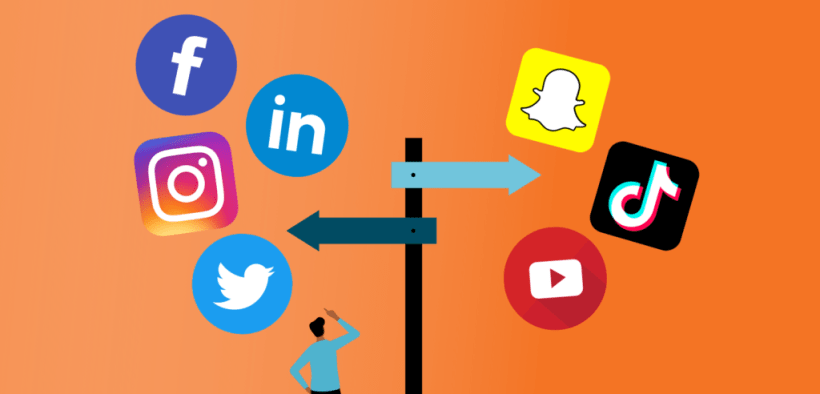The Future of Marketing: Embrace Social Media or Fade Away
Share

Exploring the Impact of Social Media on the Future of Marketing
The future of marketing is inextricably linked to the evolution of social media. As we delve into the impact of social media on the future of marketing, it becomes increasingly clear that businesses must either embrace this digital revolution or risk fading into obscurity.
In the past, traditional marketing methods such as print advertisements, billboards, and television commercials were the primary means of reaching consumers. However, the advent of social media has dramatically altered the marketing landscape. Today, platforms like Facebook, Instagram, Twitter, and LinkedIn have become indispensable tools for businesses to connect with their target audience.
The power of social media lies in its ability to foster direct and immediate communication between businesses and consumers. This interactive nature of social media has transformed the way businesses market their products and services. Instead of simply broadcasting messages, businesses can now engage in meaningful conversations with their customers, respond to their queries in real-time, and build lasting relationships.
Moreover, social media provides businesses with invaluable insights into their customers’ preferences and behaviors. Through social listening and analytics, businesses can track their customers’ conversations, understand their needs and wants, and tailor their marketing strategies accordingly. This data-driven approach to marketing not only enhances customer satisfaction but also improves the effectiveness of marketing campaigns.
Another significant impact of social media on the future of marketing is the rise of influencer marketing. Influencers, with their large and loyal following, have the power to sway their followers’ purchasing decisions. Businesses are increasingly leveraging this influence to reach a wider audience and boost their brand visibility.
However, the benefits of social media marketing extend beyond customer engagement and data-driven decision making. Social media also offers cost-effective marketing solutions. Compared to traditional marketing methods, social media marketing requires a relatively small investment, making it an affordable option for small businesses and startups.
Despite these advantages, the use of social media in marketing is not without challenges. The ever-changing algorithms of social media platforms can make it difficult for businesses to reach their target audience. Additionally, the sheer volume of content on social media can make it challenging for businesses to stand out.
To overcome these challenges, businesses must stay abreast of the latest social media trends and adapt their marketing strategies accordingly. They must also focus on creating high-quality, engaging content that resonates with their audience.
Furthermore, as privacy concerns continue to grow, businesses must ensure that their social media marketing practices are ethical and transparent. They must respect their customers’ privacy and use their data responsibly.
In conclusion, the impact of social media on the future of marketing is profound. Social media has not only changed the way businesses communicate with their customers but also how they understand and cater to their needs. As we move forward, businesses that fail to embrace social media risk being left behind. Therefore, to thrive in this digital age, businesses must harness the power of social media and use it to their advantage. They must adapt, innovate, and evolve, or they risk fading away in the face of relentless digital progress.
The Role of Social Media in Shaping the Future of Marketing
The future of marketing is being shaped by a powerful force that has revolutionized the way businesses interact with consumers: social media. As we delve into the role of social media in shaping the future of marketing, it becomes clear that businesses must either embrace this new platform or risk fading into obscurity.
Social media has become an integral part of our daily lives, with billions of people worldwide using platforms such as Facebook, Instagram, Twitter, and LinkedIn. These platforms have transformed the way we communicate, share information, and even make purchasing decisions. Consequently, they have also reshaped the marketing landscape, offering businesses new and innovative ways to reach and engage with their target audience.
One of the most significant ways social media is shaping the future of marketing is through its ability to facilitate direct and immediate communication between businesses and consumers. Traditional marketing methods often involve a one-way flow of information, from the business to the consumer. However, social media allows for two-way communication, enabling consumers to voice their opinions, ask questions, and engage in discussions with businesses. This interaction not only fosters a sense of community and loyalty but also provides businesses with valuable insights into consumer preferences and behaviors.
Moreover, social media platforms offer businesses the opportunity to target their marketing efforts more precisely. Through sophisticated algorithms, these platforms can analyze user data to determine individual interests, behaviors, and demographics. This information allows businesses to tailor their marketing messages to specific segments of their audience, thereby increasing the effectiveness of their campaigns.
Another significant aspect of social media marketing is its potential for virality. A single post can reach millions of users worldwide in a matter of hours, providing an unparalleled opportunity for brand exposure. This potential for widespread reach, combined with the ability to engage directly with consumers, makes social media a powerful tool for building brand awareness and reputation.
However, the power of social media also comes with challenges. The open and public nature of social media platforms means that businesses must be prepared to handle negative feedback and criticism in a transparent and professional manner. Additionally, the ever-changing nature of social media trends requires businesses to stay up-to-date and adapt their strategies accordingly.
Furthermore, as consumers become increasingly savvy and discerning, businesses must strive to create authentic and meaningful content. The era of blatant self-promotion is fading, and consumers now value genuine engagement and meaningful interactions. Therefore, businesses must focus on building relationships and providing value to their audience, rather than simply pushing their products or services.
In conclusion, the role of social media in shaping the future of marketing is undeniable. It offers businesses a unique opportunity to engage directly with consumers, tailor their marketing efforts, and reach a global audience. However, to harness the power of social media, businesses must be prepared to navigate its challenges and adapt to its ever-changing landscape. Those that fail to embrace social media risk being left behind in an increasingly digital and interconnected world. Therefore, the future of marketing is clear: embrace social media or fade away.
Embrace Social Media: The Key to Surviving the Future of Marketing
In the rapidly evolving world of business, the future of marketing is becoming increasingly intertwined with the realm of social media. As traditional marketing methods continue to lose their effectiveness, the need to embrace social media as a primary marketing tool has become more than just a trend; it is now a necessity for survival.
The rise of social media has fundamentally altered the marketing landscape. It has shifted the power dynamics from the hands of marketers to the consumers, who now have the ability to voice their opinions, share their experiences, and influence their peers on a global scale. This shift has necessitated a change in marketing strategies, with businesses needing to engage with their customers on a more personal level, fostering relationships rather than simply pushing products.
Social media platforms such as Facebook, Instagram, Twitter, and LinkedIn have become the new battlegrounds for businesses. These platforms offer a wealth of opportunities for marketers to reach out to their target audience, engage with them, and build brand loyalty. They provide a platform for businesses to showcase their products and services, share their stories, and connect with their customers on a personal level.
Moreover, social media marketing offers a level of targeting and personalization that is unparalleled by traditional marketing methods. With the vast amount of data available on social media platforms, businesses can target their marketing efforts to specific demographics, interests, and behaviors, ensuring that their messages reach the right audience at the right time. This level of precision not only increases the effectiveness of marketing campaigns but also reduces wastage of resources.
However, the power of social media marketing extends beyond its ability to reach and engage with customers. It also provides businesses with valuable insights into their customers’ behaviors, preferences, and needs. By analyzing social media data, businesses can gain a deeper understanding of their customers, enabling them to create more effective marketing strategies and deliver more personalized customer experiences.
Furthermore, social media has also opened up new avenues for customer service. Customers now expect businesses to be available and responsive on social media platforms, turning these platforms into important customer service channels. By promptly responding to customer inquiries and complaints on social media, businesses can enhance their customer service, improve customer satisfaction, and build stronger relationships with their customers.
However, embracing social media is not without its challenges. The dynamic nature of social media requires businesses to be agile and adaptable, constantly monitoring trends and adjusting their strategies accordingly. It also requires a significant investment of time and resources to manage social media accounts, create engaging content, and respond to customer interactions.
Despite these challenges, the benefits of embracing social media far outweigh the costs. In the future of marketing, businesses that fail to embrace social media risk being left behind. They risk losing their relevance, their connection with their customers, and ultimately, their competitive edge.
In conclusion, the future of marketing lies in social media. It is a powerful tool that offers businesses a multitude of opportunities to connect with their customers, build brand loyalty, and drive business growth. Businesses that embrace social media, adapt to its dynamic nature, and leverage its potential will not only survive but thrive in the future of marketing. Those that fail to do so risk fading away into obscurity. Therefore, the choice is clear: embrace social media or fade away.
Fade Away or Adapt: The Choice for Marketers in the Social Media Era
In the rapidly evolving world of business, the future of marketing is becoming increasingly intertwined with the realm of social media. As we delve deeper into the digital age, traditional marketing strategies are being overshadowed by the dynamic and interactive nature of social media platforms. Marketers are now faced with a critical choice: adapt to the changing landscape and embrace social media, or risk fading into obscurity.
The rise of social media has fundamentally altered the way businesses interact with their customers. Gone are the days when marketing was a one-way street, with businesses broadcasting their messages to a passive audience. Today, consumers expect to engage in a dialogue with brands, voicing their opinions, sharing their experiences, and even influencing product development. Social media platforms provide the perfect environment for this two-way communication, fostering a sense of community and loyalty among consumers.
Moreover, social media offers unparalleled opportunities for targeted marketing. With the wealth of data available on these platforms, businesses can now tailor their marketing efforts to specific demographics, interests, and behaviors. This level of personalization not only increases the effectiveness of marketing campaigns but also enhances the customer experience, making consumers feel valued and understood.
However, the transition to social media marketing is not without its challenges. The sheer volume and velocity of information on these platforms can be overwhelming, requiring businesses to be constantly on their toes. Additionally, the public nature of social media can amplify any missteps, potentially causing significant damage to a brand’s reputation. Therefore, businesses must approach social media marketing with a well-thought-out strategy, balancing the need for engagement with the risks of public scrutiny.
Despite these challenges, the benefits of social media marketing far outweigh the potential pitfalls. Businesses that fail to adapt to this new reality risk losing their relevance in the eyes of consumers. In contrast, those that successfully harness the power of social media can gain a competitive edge, driving growth and innovation.
The shift towards social media marketing also has profound implications for the role of marketers. Rather than simply crafting and disseminating messages, marketers are now expected to be active participants in the conversation, responding to customer feedback, managing online communities, and even acting as brand ambassadors. This requires a new set of skills and competencies, including digital literacy, data analysis, and crisis management.
In conclusion, the future of marketing lies in social media. As the digital landscape continues to evolve, businesses must adapt or risk fading away. This requires not only a shift in strategy but also a change in mindset, viewing social media not as a threat but as an opportunity. By embracing social media, businesses can engage with their customers on a deeper level, personalize their marketing efforts, and stay ahead of the curve in an increasingly competitive market. The choice for marketers in the social media era is clear: adapt and thrive, or resist and fade away.






